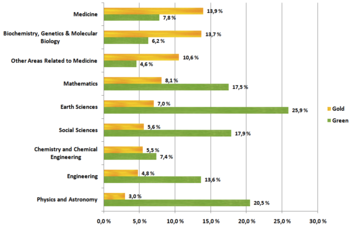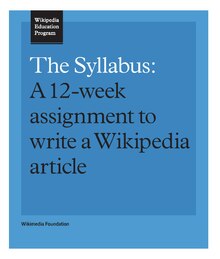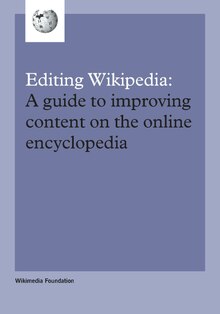Wikipedia:Meetup/Providence, RI/Brown University/2014
|
Open Access Week Wikipedia Edit-a-Thon |
|---|
 When: Thursday October 23, 3:30-8pm You do not need to be an experienced Wikipedia editor in order to attend, just bring a willingness to learn. Hashtags: #OpenAccess and #OAW2014 RSVP by signing your username below (preferred). If you are unfamiliar with Wikipedia, try this training module which will help explain a lot of things, including how to add your signature. Or, sign up on the Meetup page This edit-a-thon is part of the eighth annual Open Access Week, an international event created to educate academics and researchers about Open Access (OA), and to potentially encourage them to make it the new norm for circulating their work. |
What is Open Access?
[edit]"An old tradition and a new technology have converged to make possible an unprecedented public good. The old tradition is the willingness of scientists and scholars to publish the fruits of their research in scholarly journals without payment, for the sake of inquiry and knowledge. The new technology is the internet. The public good they make possible is the world-wide electronic distribution of the peer-reviewed journal literature and completely free and unrestricted access to it by all scientists, scholars, teachers, students, and other curious minds. Removing access barriers to this literature will accelerate research, enrich education, share the learning of the rich with the poor and the poor with the rich, make this literature as useful as it can be, and lay the foundation for uniting humanity in a common intellectual conversation and quest for knowledge." ~ Budapest Open Access Initiative
"Open access contributions must satisfy two conditions:
- The author(s) and right holder(s) of such contributions grant(s) to all users a free, irrevocable, worldwide, right of access to, and a license to copy, use, distribute, transmit and display the work publicly and to make and distribute derivative works, in any digital medium for any responsible purpose, subject to proper attribution of authorship (community standards, will continue to provide the mechanism for enforcement of proper attribution and responsible use of the published work, as they do now), as well as the right to make small numbers of printed copies for their personal use.
- A complete version of the work and all supplemental materials, including a copy of the permission as stated above, in an appropriate standard electronic format is deposited (and thus published) in at least one online repository using suitable technical standards (such as the Open Archive definitions) that is supported and maintained by an academic institution, scholarly society, government agency, or other well-established organization that seeks to enable open access, unrestricted distribution, inter operability, and long-term archiving." ~ Berlin Declaration on Open Access to Knowledge in the Sciences and Humanities
"Open access (OA) means unrestricted online access to peer-reviewed scholarly research. Open access is primarily intended for scholarly journal articles, but is also provided for a growing number of theses, book chapters, and scholarly monographs. Open access comes in two degrees: gratis open access, which is free online access, and libre open access, which is free online access plus some additional usage rights. These additional usage rights are often granted through the use of various specific Creative Commons licenses. Only libre open access is fully compliant with definitions of open access such as the Berlin Declaration on Open Access to Knowledge in the Sciences and Humanities. The two ways authors can provide open access are (1) by self-archiving their journal articles in an open access repository, also known as 'green' open access, or (2) by publishing in an open access journal, known as 'gold' open access. With green open access authors publish in any journal and then self-archive a version of the article for gratis public use in their institutional repository, in a central repository (such as PubMed Central), or on some other open access website. With gold open access, authors publish in open access journals, which provide immediate open access to all of their articles, usually on the publisher's website. Hybrid open access journals are subscription journals that provide gold open access only for those individual articles for which their authors (or their author's institution or funder) pay an open access publishing fee. Widespread public access to the World Wide Web in the late 1990s and early 2000s fueled the open access movement, and prompted both the green open access self-archiving of non-open access journal articles and the creation of gold open access journals. Conventional non-open access journals cover publishing costs through access tolls such as subscriptions, site licenses or pay-per-view. Some non-open access journals provide open access after an embargo period of 6–12 months or longer (see delayed open access journals). Active debate over the economics and reliability of various ways of providing open access continues among researchers, academics, librarians, university administrators, funding agencies, government officials, commercial publishers, editorial staff and society publishers." ~ Wikipedia
More on Open Access (OA)
[edit]
Wikipedia Articles Related to OA
[edit]Open Access
Open Access Week
WikiProject Open Access
- WikiProject OA Tasks
- List of open access projects
- Reusing Open Access materials on Wikimedia projects (Video)
Wikisource
WikiProject Academic Journals
Open Access Scholarly Publishers Association
Linked Data
Open Access Definitions, Statements, and Related Material
[edit]Suber, Peter. ""Open Access Overview"". The SPARC Open Access Newsletter. Retrieved 22 October 2014.
Directory of Open Access Journals (DOAJ) Info Page
Open Access Directory (OAD) List of Blogs on OA
Open Access Statements (via OAD)
http://www.openscholarship.org/jcms/c_5012/en/hom EnablingOpenScholarship (EOS)
Open Access Scholarly Information Sourcebook (OASIS)
Electronic Frontier Foundation Page on OA
Davis, Philip M. (Dec 22, 2004). "Calculating the Cost per Article in the Current Subscription Model". eCommons@Cornell. Retrieved 22 October 2014.
OA and the Humanities
[edit]Brown University Library Hall-Hoag collection of dissenting and extremist printed propaganda
John Carter Brown Library Online Collections
Thomas, Lindsay (Dec 16, 2013). "Open Access and the Digital Humanities" (Blog Post). Retrieved 14 October 2014.
Open Library of the Humanities
Open Humanities
Film Studies for Free
Ada: A Journal of Gender, New Media, and Technology
ABO: Interactive Journal for Women in the Arts, 1640-1830
Beyond OA
[edit]This week focuses on academic research, but there are also related issues of open source data and technology as well as government transparency efforts. Here is a bit on those efforts.
- Sunshine in Government Initiative, draws it name from the Government in the Sunshine Act (1976)
- Open Government Initiative
- Code for America - a nonprofit working to build open source technology and create local networks focused on improving government services.
- Code Island Projects - Rhode Island's Code for American Brigade
- Providence Mayoral Candidate Responses to Open Data Survey
- Open Source Technology: Code for America GitHub Repository and Code Island GitHub Repository
- Wikipedia isn't the only Wiki: One of many examples: Rhode Island Wiki
Educating the Open Generation: Panel on Open Data and Data Sharing at the DSL with Jo Guldi and Elizabeth M. Wolkovich (Wednesday, October 22, 4 p.m.)in the Digital Scholarship Lab in Rockefeller Library at Brown University.
Schedule
[edit]NB: There is a basic schedule, but please feel free to stop by when and for however long you can.
3:30-4:00 Check-in & Welcome: What is Open Access Week?
4:30-5:30 Basics of Wikipedia Editing, Q&A, Self-Organizing
5:30-7:00 Editing
7:00-7:30 Wrap-up & Thanks
7:30-8:00 Make sure to record Outcomes!
Session Organizers
[edit]FaulkTest (talk) 01:22, 12 October 2014 (UTC)
Dherbelot (talk) 13:16, 16 October 2014 (UTC)
A Little Editing Help
[edit]



Editing Basics
[edit]- The Five Pillars of Wikipedia
- Starting an Article
- Writing Your First Wikipedia Article
- Citation Guide
- Infobox templates
- Formatting Shortcuts -
- Wiki Markup Quick Reference
- Wikipedia Cheatsheet
- Wikipedia Image Policy
Community
[edit]- Create your user page and add some info.
- Add pages to your Watchlist to learn about subsequent edits.
- The Wikipedia Teahouse is a good place to go for help
- "How To Create Wikipedia Entries That Will Stick" by Adeline Koh and Roopika Risam.
Thoughts on Wikipedia & Education
[edit]- More Resources from the Wikipedia Education Program
- "A Very Short History of Wikipedia" by Jacque Wernimont
- "Wikipedia in the Classroom Resource List" by Jacque Wernimont
- "Be Bold...Skip the Review" by Jacque Wernimont
- "Teaching with Wikipedia Resources" by FemTechNet (old site)
- "Wiki-hacking: Opening up the academy with Wikipedia" by Adrianne Wadewitz, Anne Ellen Geller, Jon Beasley-Murray
- "Template for a handout on student evaluations of Wikipedia articles" by Michelle Moravec
Open Access Resources
[edit]Directory of Open Access Journals (DOAJ) Search Page
Brown Library Open Access Resource Page
Customized List of Open Access Resources for Faculty on Brown University Library Wiki
Open Access Directory (OAD)
PLOS (Public Library of Science) Resources
Scholarly Publishing and Academic Resources Coalition (SPARC) Resource Page]
Open Access Bibliography
Outcomes
[edit]Please share your contributions here.
Improved David Kertzer article
Improved Joseph Schillinger article
Improved Rockefeller Library article
Discussed making more images of the Brown Libraries Open Access and on Wikimedia Commons
